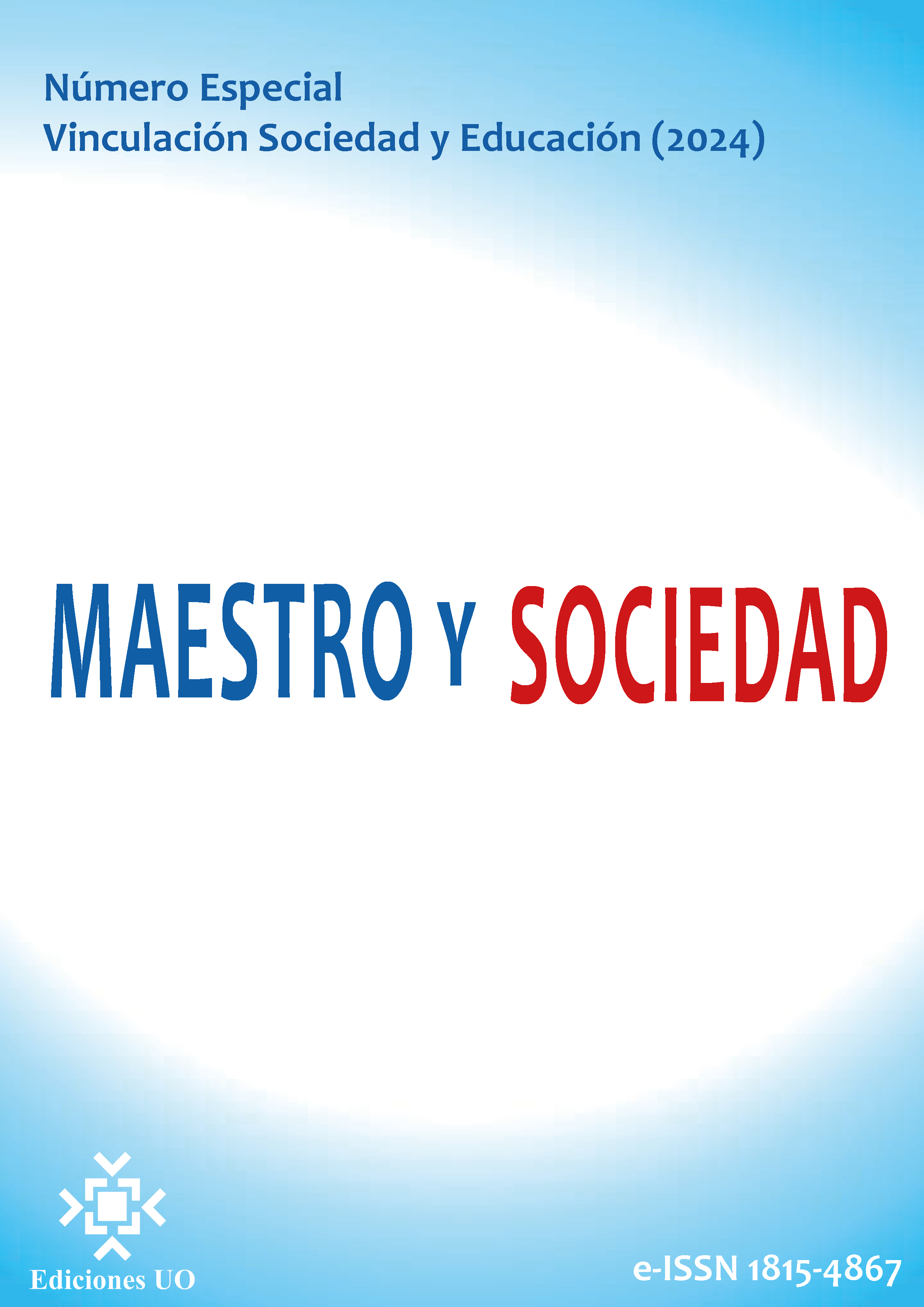Self-perceptive study of the digital skills of teachers in the field of pedagogy in District 13D11
Keywords:
ICT, teaching competence, digital competence, educationAbstract
The digital world in which we live forces us to make changes in different contexts of society, to keep up with the community demands. One of these contexts is education, where teachers had to make use of ICTs to develop teaching skills, including digital ones, which they must possess and enhance to provide a quality and warmth education. This study sought to identify the domain that teachers in District 13D11 have of the use of technology within the educational field, as well as to diagnose the level of digital illiteracy that they have. Also, the teaching perception of the impact of digital skills on educational quality will be addressed. A bibliographical review will be carried out to collect the necessary information to give support and veracity to the article where an exploratory - descriptive study with a quantitative approach is presented. The technique used for data collection was the survey. The population of the investigation was based on the educators and students of E.G.B., of the district, a sample of 144 teachers and 358 students of the upper basic sublevel was taken. For the analysis, the IBM SPSS v. 25 that facilitated the analysis of the data compared in the study. Technological innovation is here to stay, for this reason teachers, to rule out digital illiteracy, saw the need to prepare themselves in the use and management of ICTs and enhance their skills not only in disciplinary knowledge but also in the CDT (Competence digital teaching) aimed at developing collaborative learning and the construction of learning.
References
Banarroch, A., & Núñez, G. (2016). Aprendizaje de competencias científicas versus aprendizaje de contenidos especificos. Un apropuesta de evaluación. Revista de investigación y ciencias didácticas , 9-27.
Cabanillas, J. L. (2020). La búsqueda de información, la selección y creación de contenidos y la comunicación docente. RIED, 241 - 267.
Cachique, M. (2018). Uso de las Tic por parte de los docentes de las Instituciones Educativas N°00500 del Distrito de Soritor Provincia de Moyobamba. Tesis de maestría . Universidad Nacional Pedro Ruiz Gallo.
Carrillo-García, M. (2018). Apps para el aprendizaje de idiomas en la Universidad de Murcia. RED. Revista de Educación a Distancia, 58.
Cervera, G. M. (2015). Educación y tecnología: nuevos escenarios de aprendizaje desde una visión transformadora . Universities and Knowledge Society , 1 - 14.
Cervera, M. (Diciembre de 2015). Competencia digital en la educación superior: instrumentos de evaluación y nuevos entornos. Revista Venezolana de Información, Tecnología y Conocimiento, 29 - 43.
Esteve, F. C. (2018). Un Modelo Holístico de Competencia Docente para el Mundo Digital. Revista Interuniversitaria de Formación Del Profesorado, 105 - 116.
García-Valcárel, A. T. (2017). Percepción de los estudiantes sobre el valor de las TIC en sus estrategias y su relación con el rendimiento. Educación XXI, 137 - 159.
Lanuza, F. R. (2018). Uso de las Tic en el proceso de enseñanza-aprendizaje. Revista científica de FAREM-Estelí - Medio ambiente, tecnología y desarrollo humano, 16 - 30.
Latorre, M. (2017). Aprendizaje significativo y Funcional . Universidad Champagnat, 2.
Lizcano-Dallos, A. B.-C.-E. (2019). Aprendizaje colaborativo con apoyo en TIC: concepto, metodología y recursos. Magis. Revista Internacional de Investigación en Educación Vol. 12, 1-20.
Morata Sanz, J. I. (2020). Uso de TIC en orientación educativa en tiempos de COVID - 19. AOSMA, 88 - 91.
Moreira, M. (2017). Aprendizaje significativo como un referente para la organizacipon de la enseñanza. Archivos de Ciencias de la Educación. Memoria Académica, 2.
Orozco, J. D. (2018). Aprendizaje Basado en Proyectos. Experiencia didáctica en Educación Secundaria implementando las TIC en la asignatura Aprender, Emprender y Prosperar. Revista científica de FAREM-Estelí - Medio ambiente, tecnología y desarrollo humano, 38 - 51.
Padilla-Hernández, A. G.-S.-L. (2019). Competencia digital docente: apuntes sobre su conceptualización. Virtualis, 195-212.
Páez, R. &. (2016) Aproximación docimológica a la evaluación de competencias digitales y didácticas de profesores universitarios. Revista Iberoamericana de Evaluación Educativa 5(1), 282 - 288.
Rojas, A. R. (2018). Aplicación del módulo de Alfabetizacipon Digital y desarrollo de competencias digitales en docentes. COMUNI@CCIÓN, 191 - 109.
Rangel, A. (2015). Competencias docentes digitales: propuesta de un perfil. Revista de Medios y Educación , 235 - 248.
Sandi, J. S. (2018). Revisión y análisis sobre comoetencias tecnológicas epseradas en el profesorado de Iberoamérica. EDUTEC. Revista Eectrónica de Tecnología Educativa, 93 - 121
UNESCO. (2019). Marco de Competencias de los Docentes en materia de TIC. UNESCO.
Zavala, M. y. (2016). Un enfoque de las competencias digitales de los docentes . Revista Publicando , 333 - 340.
Published
How to Cite
Issue
Section
License
Copyright (c) 2024 Yajaira Marisol Cedeño Castillo, Elizabeth del Carmen Ormaza Esmeraldas

This work is licensed under a Creative Commons Attribution-NonCommercial-NoDerivatives 4.0 International License.
This journal provides immediate open access to its content, based on the principle that offering the public free access to research helps a greater global exchange of knowledge. Each author is responsible for the content of each of their articles.



























 Universidad de Oriente
Universidad de Oriente 